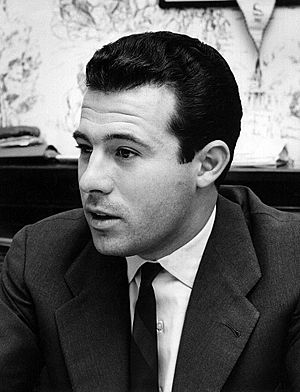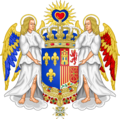Alfonso, Duke of Anjou and Cádiz facts for kids
Quick facts for kids Alfonso |
|||||
|---|---|---|---|---|---|
| Duke of Anjou and Duke of Cádiz | |||||

Alfonso in 1963
|
|||||
| Legitimist pretender to the French throne as Alphonse II/III |
|||||
| Pretense | 20 March 1975 – 30 January 1989 | ||||
| Predecessor | Henri VII | ||||
| Successor | Louis XX | ||||
| Duke of Cádiz | |||||
| Tenure | 22 November 1972 – 30 January 1989 | ||||
| Successor | Reverted to the Crown | ||||
| Born | 20 April 1936 Clinico di Sant'Anna, Rome, Kingdom of Italy |
||||
| Died | 30 January 1989 (aged 52) Avon, Colorado, U.S. |
||||
| Burial | Las Descalzas Reales | ||||
| Spouse | María del Carmen Martínez-Bordiú y Franco (m. 1972; div. 1982) | ||||
| Issue | François, Dauphin of France Prince Louis, Duke of Anjou |
||||
|
|||||
| House | Bourbon | ||||
| Father | Infante Jaime, Duke of Anjou and Segovia | ||||
| Mother | Emmanuelle de Dampierre, Duchess of Anjou and Segovia | ||||
| Religion | Roman Catholicism | ||||
Alfonso, Duke of Anjou, Duke of Cádiz (born April 20, 1936 – died January 30, 1989) was a grandson of King Alfonso XIII of Spain. He was considered a possible heir if the Spanish monarchy was restored. He also claimed to be the rightful heir to the French throne, known by his supporters as Alphonse II or III.
Contents
Early Life and Family
Alfonso was born in Rome, Italy. His father was Infante Jaime, Duke of Segovia, who was King Alfonso XIII's second son. His mother was Emanuela de Dampierre. At the time, the Spanish royal family lived in Rome because they had left Spain after elections in 1931.
Alfonso was baptized by Eugenio Cardinal Pacelli, who later became Pope Pius XII. In 1941, Alfonso and his parents moved to Lausanne, Switzerland. He and his younger brother, Gonzalo, attended Collège Saint-Jean in Fribourg.
Spanish Royal Succession
The Spanish monarchy faced changes after 1931. King Alfonso XIII's eldest son, Alfonso, Prince of Asturias, gave up his claim to the throne. This was because he had hemophilia and married someone who was not of royal birth.
Next in line was Alfonso's father, Infante Don Jaime. He was deaf and was also persuaded to give up his claim to the throne. This meant that King Alfonso's third son, Don Juan, became the main hope for restoring the monarchy.
However, after the Spanish civil war, General Francisco Franco became the leader of Spain. Franco made Spain a kingdom again in 1947, but he kept the power to choose who would be king and when. This meant that Don Juan was not automatically the next king.
Franco wanted to choose a king who would be loyal to him. He considered Don Juan's son, Juan Carlos, as a possible future king. But Franco also thought of Alfonso as an alternative if Juan Carlos was not loyal enough.
In 1949, Alfonso's father, Don Jaime, said he wanted his claim to the throne back. He argued that he had been forced to give it up. In 1952, Franco asked Don Jaime to send Alfonso to Spain for his education. Alfonso moved from Switzerland to Spain and studied law.
Franco continued to consider both Juan Carlos and Alfonso for the throne. In 1969, Franco decided to name Juan Carlos as his successor, meaning Juan Carlos would become king after Franco. Alfonso supported this decision and was even a witness at the ceremony where Juan Carlos was declared Prince of Spain. Later, Alfonso became Spain's ambassador to Sweden.
Marriage and Family Life
On March 8, 1972, Alfonso married María del Carmen Martínez-Bordiú y Franco in Madrid. Carmen was the only daughter of Franco's daughter, Carmen Franco y Polo. Franco himself and Alfonso's mother were witnesses at the wedding.
Alfonso and Carmen separated in 1979. They divorced in 1982, and their marriage was officially cancelled by the church in 1986.
They had two sons:
- Don Francisco de Asís Alfonso Jaime Cristóbal Víctor José Gonzalo Cecilio de Borbón y Martínez-Bordiú, Duke of Bourbon (born November 22, 1972 – died February 7, 1984).
- Don Luis Alfonso Gonzalo Víctor Manuel Marco de Borbón y Martínez-Bordiú, Duke of Anjou (born April 25, 1974).
On November 22, 1972, General Franco gave Alfonso the Spanish title Duque de Cádiz (Duke of Cádiz) and the special rank of Grandee of Spain.
French Royal Succession
Alfonso's mother was not born a princess from a royal family. Because of this, his grandfather, King Alfonso XIII, did not see Alfonso as being in line for the Spanish throne.
However, some people, called Legitimists, believed that Alfonso XIII was also the rightful heir to the French throne. When his grandfather died in 1941, Alfonso's father, Jaime, took on this French claim. Alfonso was then recognized by these Legitimists as the Dauphin of France, which is the title for the heir to the French throne.
In 1950, Alfonso received the title Duc de Bourbon (Duke of Bourbon) from his father. When his father Jaime died on March 20, 1975, Alfonso was immediately recognized by his supporters as King Alphonse II of France. Later, he took the title Duc d'Anjou (Duke of Anjou).
Later Life and Death
From 1977 to 1984, Alfonso was the President of the Spanish Skiing Federation. From 1984 to 1987, he was the President of the Spanish Olympic Committee.
Alfonso died in a skiing accident on January 30, 1989, in Colorado, USA. He collided with a cable that was being raised to support a banner at the finish line of a ski course.
Honours
 Sovereign Military Order of Malta: Bailiff Knight Grand Cross of Honour and Devotion
Sovereign Military Order of Malta: Bailiff Knight Grand Cross of Honour and Devotion Spain: Knight Grand Cross of the Order of Isabella the Catholic
Spain: Knight Grand Cross of the Order of Isabella the Catholic Sweden: Commander Grand Cross of the Royal Order of the Polar Star
Sweden: Commander Grand Cross of the Royal Order of the Polar Star
Dynastic Honours
 House of Bourbon-France: Sovereign and Knight of the Royal Order of Saint Michael
House of Bourbon-France: Sovereign and Knight of the Royal Order of Saint Michael House of Bourbon-France: Sovereign and Knight of the Royal Order of the Holy Spirit
House of Bourbon-France: Sovereign and Knight of the Royal Order of the Holy Spirit House of Bourbon-France: Sovereign and Knight of the Royal and Military Order of Saint Louis
House of Bourbon-France: Sovereign and Knight of the Royal and Military Order of Saint Louis House of Savoy: Knight Grand Cordon of the Royal Order of Saints Maurice and Lazarus
House of Savoy: Knight Grand Cordon of the Royal Order of Saints Maurice and Lazarus House of Bourbon-Two Sicilies: Knight Grand Cross of Justice of the Sacred Military Constantinian Order of Saint George
House of Bourbon-Two Sicilies: Knight Grand Cross of Justice of the Sacred Military Constantinian Order of Saint George
Images for kids
See also
 In Spanish: Alfonso de Borbón y Dampierre para niños
In Spanish: Alfonso de Borbón y Dampierre para niños



